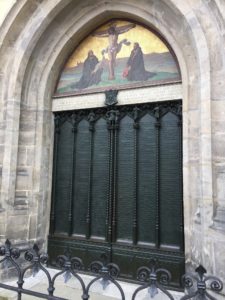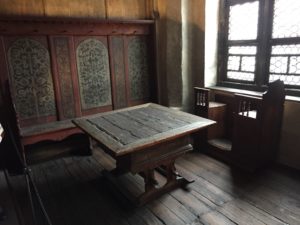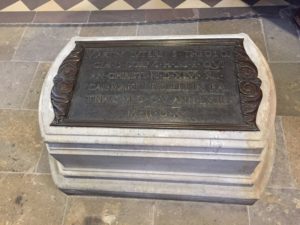
Our big day had finally arrived.
We were sitting in the lounge at 8:30 a.m. waiting for the cruise director to call our group to board the bus to Wittenberg.
I had spent about an hour in the Word earlier in the morning and was prepared for the day. Now, I was itching with anticipation.
I tried to turn the conversation to Wittenberg and the day ahead of us to no avail.
The Wife: “This Bloody Mary is too sweet.”
Ann: “Yes it is, and you would think that would make me stop drinking it but no.”
Just about this time our group was called and we headed for the bus.
Wittenberg was the only place we have visited on this trip that felt touristy. Big buses dropped off people near the entrance, the streets were crowded, and tour groups crowded near one another and strained to hear their guide over the guide of the group next to them.

There were numerous stores with Luther chachka; Luther t-shirts, cups, even Luther beer. To mix a metaphor—if Luther was alive today he would roll over in his grave. I actually say this more as an observation than a complaint. It’s probably unavoidable in a free market economy, and it enables the preservation of Old Town Wittenberg. In fact, during the Communist era Old Town Wittenberg had fallen into disrepair, a fact of which our Prague tour guide was no doubt unaware.
One really needs two days in Wittenberg, and our cruise had only scheduled an afternoon. As a result, we were hitting the high points at each spot and moving on, and that was not enough time.
All that aside, Wittenberg was amazing. We started at the Castle Church, with the famed Wittenberg Door upon which Luther nailed his Ninety-Five Theses and marked the beginning of the Reformation. The original door is no longer there, and the door that is there is bronze with the Ninety-Five Theses etched into it. Still it is the place where the door was, in the spot where Luther stood and changed the world.
Inside the church we saw the graves of Luther and Philip Melanchthon. They are located at the front of the church but they are not ornate and clearly not designed to bring glory to the two men. They are just slabs on the floor with inscriptions. It reminded me of Calvin’s grave we had seen in Geneva and his instructions to his followers about his burial to ensure people did not fall into the same veneration error he had spent his life opposing.
We then went to the house of Lucas Cranach the Elder, the Town Church, where Luther preached, Wittenberg University, and Melanchthon’s house. When God moves in history he raises up leaders. Even Jesus had his disciples. Luther had Melanchthon and Cranach, and Jesus had all three of them.
We finished at the Black Cloister, formerly a monastery where Martin Luther lived from 1524 until his death in 1546. It was a gift from the Electorate of Saxony to Luther after it was abandoned as a monastery during the Reformation. Luther wrote the Ninety-Five Theses here. And after his death, Luther’s wife, Katharina Von Bora, continued to live here in between wars and the plague until her death in 1552 in Torgau.

Luther’s house is now a museum and there was much to see but the highlight for me and The Wife was the room and table where Luther’s “table talks” took place. I had been reading The Table Talk of Martin Luther in anticipation of the trip and it was fascinating to see the place where those talks occurred. In this room Luther would discuss life and theology, and answer questions of the students and guests who lodged with him at the Black Cloister. Invariably those present would write down what Luther said and Table Talk is the compilation of those discussions.
Table Talk reveals a part of Luther that Christians find shocking. He makes harsh statements about the Pope and Jews that moderns would find offensive. Others have explained the context of Luther’s remarks, and noted they were off-the-cuff, made at the table, and not in his writings. I needn’t add to that.
The important takeaway is that Luther was not a reasonable man, but reasonable people do not change the world. If Luther had been reasonable, he would have taken a position within the Roman Catholic Church that was reasonable and not offensive to anyone. He might have pushed for reform from within, respectfully, and probably received the same response as others had before him, and we would all be the worse for his reasonableness.
Instead, like Wycliffe and Hus before him, Luther was inspired by the Holy Spirit to stand on the firm ground of the Word of God, even if it set him against the church and the rulers of his day. And for all that, we can grant him the same grace he fought for for us, recognizing he was a man used by God, and is a man to which we are all indebted. GS

